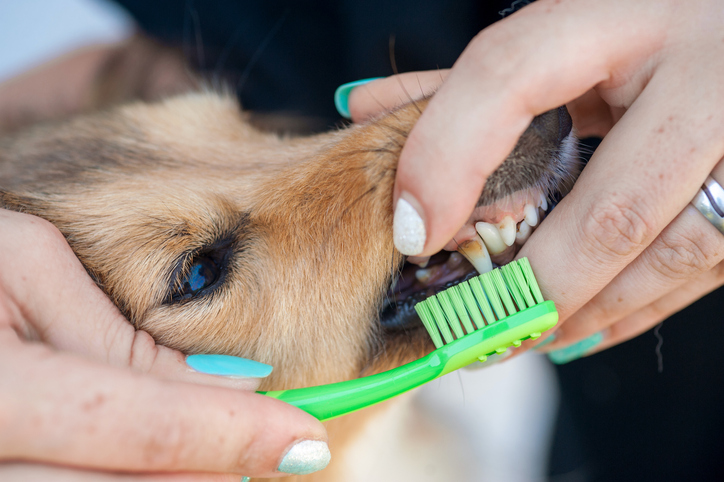How Often Should I Clean My Dog’s Teeth in Groveport, OH?
Your dog’s dental health is important, and many veterinarians recommend that you have your dog’s teeth checked at least once a year, and sometimes more often for certain smaller and toy breeds.
Why Dog Teeth Cleaning is Important
Just like us, dogs need regular dental care too. Periodontal disease affects pets and is caused by plaque, which is made of saliva, food, cells, and other things that form on the teeth just minutes after eating. Tooth plaque builds up and can lead to gum inflammation, which in turn can destroy gum tissue and bone. Unlike humans, periodontal disease in pets occurs five times as often as it does in people, and one statistic has shown that more than 80% of dogs over three years old have periodontal disease. If periodontal disease progresses, it sets your dog up for loose teeth, a painful mouth, bleeding gums, and systemic infections such as endocarditis (where bacteria enter the chambers of the heart and causes inflammation).
Frequency of Dog Teeth Cleaning
The question of how often you should have your dog’s teeth cleaned depends on several factors, such as breed, age, and lifestyle of your dog.
Breed
Smaller dogs and toy breeds may need teeth cleanings as young a two years of age, but it’s important to keep in mind that most dogs don’t need a dental before the age of six or seven. Small dogs need dental cleanings more often than larger dogs because their teeth, relative to their mouths, are big, which causes overcrowding. Another reason is that smaller breeds (such as Yorkies) are notorious for hanging onto their baby teeth in addition to their adult teeth, which adds to overcrowding, which then leads to more places for tartar build-up. Dogs with short faces and noses, such as Pugs, Bulldogs, and Shih Tzus are more at risk for dental disease because they are prone to have deformed teeth, which gives more places for tartar to hide, and odd-shaped tooth roots that can predispose them to endodontic disease. Small dogs have very shallow tooth roots, so any kind of periodontal disease can affect them more severely than bigger dogs. Another breed-related dental issue is something called malocclusion, where the jaws are misaligned so that they don’t connect properly. This can lead to a predisposition to dental disease and tartar build-up. Larger dogs don’t tend to have the dental issues that small dogs have, but they are prone to broken or fractured teeth due to strong chewing habits, and this can cause mouth pain, inappetence, and irritable behaviors. If you schedule regular exams with your veterinarian, they will be able to tell you when and how often your dog needs a teeth cleaning.
Age
Older dogs tend to need more dental care than younger dogs, and the reason is simply that time, diet and eating habits contribute to oral decay over time. So it’s always a good idea to have annual exams with your veterinarian if your dog is over seven years of age to make sure his teeth and gums are healthy.
Lifestyle and Diet
If your dog is a heavy chewer or has a particular diet also affects how often a teeth cleaning is needed. For example, rigorous chewers can damage enamel and teeth, causing teeth to fracture and break. Broken teeth can lead to infections and abscesses, which in turn may lead to needed extractions. Also, your dog’s diet can have an impact on dental health as well. If your dog eats mainly dry kibble, there is less of a chance of developing plaque and tartar than if she were on a moist diet.
Professional Dog Teeth Cleaning in Groveport, OH
Dog teeth cleanings and procedures allow the veterinarian to closely inspect your dog’s mouth, teeth, oral cavity, and gums, and also allow the veterinarian to take x-rays to look for possible problems not visible to the naked eye. Unlike people, dogs are reluctant to sit back in a chair and sit for teeth cleaning, so veterinarians recommend general anesthesia for your dog while undergoing a dental procedure. The reasons for this are that if your veterinarian needs to do dental x-rays, scaling, or tooth extractions, it’s safer to do this under anesthesia, and better for your dog. For example, dogs are fully intubated while undergoing a dental, which means that there is little chance of aspiration of water and bacteria (which can cause pneumonia and endocarditis), and if extractions are needed, your veterinarian can provide adequate pain relief that can help your pet recover more comfortably.
As most dental procedures are performed under anesthesia, your veterinarian will be sure to conduct a thorough physical examination before anesthesia. Depending on several factors, and the age and health of your dog, your veterinarian may recommend blood work before the procedure to ensure that your dog’s liver and kidneys can adequately process anesthetic agents. If the blood work is good, and any other diagnostics are normal, then your dog will be ready for a teeth cleaning. The process usually entails the placement of an IV (intravenous) catheter, IV fluids, a pre-anesthetic dose to help your animal relax, and then the induction period when your dog is placed under anesthesia. Just as with humans undergoing general anesthesia, your veterinarian will closely monitor vital signs such as blood pressure, oxygen saturation, heart function, body temperature, and other cardio-respiratory values. Your veterinarian will conduct a thorough oral exam, just as a human dentist would, and may also take mouth x-rays. After the procedure, your veterinarian will “wake up” your dog, place him in recovery where post-procedure vitals are monitored. Most veterinarians do their dental procedures in the morning and send their patients home at the end of the day.
How to Help Keep Your Dog’s Teeth Healthy
If your dog will let you, brushing your dog’s teeth is an effective way to help keep your best friend’s teeth and gums healthy. There are many products available that can help you improve your dog’s oral health, such as dental chews, water additives, enzymatic toothpaste, and specially formulated dental diets. Book an appointment online or call (614) 836-3222 to talk with your veterinarian at Groveport Canal Animal Hospital about dog teeth cleaning in Groveport, OH!


